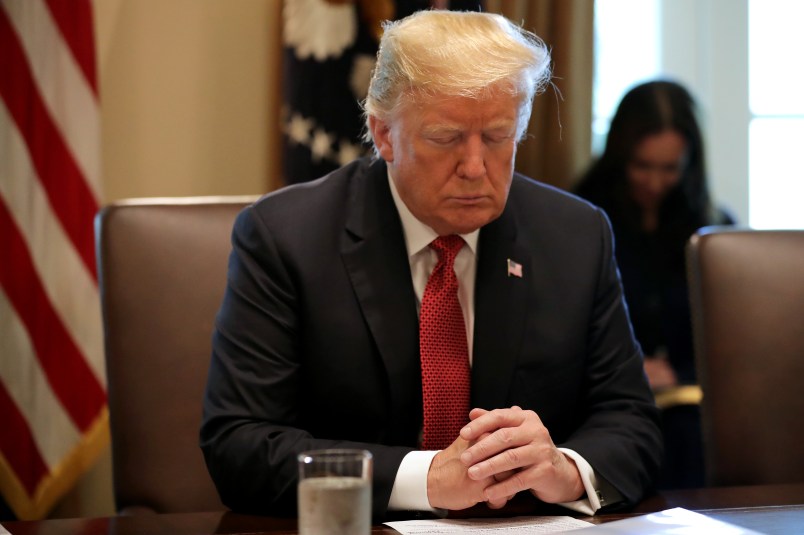The Manhattan federal judge who immediately blocked an attempt from President Trump to halt a Congressional subpoena for his financial records told private attorneys hired by the President that their case was not “serious.”
During the hour-long read of his opinion on Wednesday, U.S. District Judge Edgardo Ramos drew a distinction between the “serious political ramifications” of the investigation into a president’s finances, and what constitutes a “serious” question to be considered by a judge.
“The court concludes that the plaintiffs have not raised any serious questions,” Ramos said.
He added that, “even if the questions were sufficiently serious, injunctive relief would be unwarranted.”
Trump’s arguments in the matter have come under attack as an attempt to delay Congressional investigations until past the 2020 elections.
Ramos declined to issue a preliminary injunction halting the enforcement of subpoenas sent by the House Financial Services and Intelligence Committees to longtime Trump lenders Deutsche Bank and Capital One in a Wednesday court hearing.
The judge drew special attention to the question of timing during his ruling, saying that “any delay in the proceedings may result in irreparable harm to the Committees.”
He added that the law in the matter was “well-settled.”
“Courts have long recognized a clear public interest in maximizing Congress’s power to investigate,” Ramos intoned.
Trump had argued that because House Democrats’ motives for accessing the information was “political,” the judge should strike down the subpoenas as unconstitutional.
“Propriety of legislative motives is not a question left to the courts,” Ramos said.
He added that, rather, the question was “left to voters, not judges.”
The bench ruling came two days after D.C. federal judge Amit Mehta issued a lengthy and broad opinion denying a similar request from Trump to shut down a Congressional subpoena to his accountant Mazars. In that opinion, Mehta compared Trump’s behavior to that of President Buchanan.
Ramos called Mehta’s opinion “thorough,” and quoted it in his own ruling.
The judge’s decision followed lengthy and contentious oral arguments, during which the judge took pain to grill both sides.
The private attorney representing Trump at the hearing — Patrick Strawbridge of Consovoy McCarthy Park — stammered as he attempted to respond to an initial volley of questions from Ramos.
Trump had argued that the subpoenas lacked a “legitimate legislative purpose,” meaning that Congress had issued “illegal” requests while repeatedly referring to the President’s “private financial affairs.”
Ramos asked Strawbridge, “In fact, don’t they provide a number of valid legislative reasons?”
The Trump attorney replied, “We do not believe that they do,” before accusing the House of using an investigation into “unsafe lending practices” as a cover for “law enforcement activity.”
Ramos then said that Congress may have been providing an “encouragement to follow the law” in its statements and asked Strawbridge, “Why is that an inappropriate thing for Congress to be encouraging?”
The Trump attorney then repeated his accusation that the House was trying to act as a law enforcer, before saying that it was a problem because it relates to Trump’s “private affairs” and was “not about his activities in office.”
Ramos went on to say that Trump’s lawyers also complained about the subpoenas’ breadth, asking Strawbridge: “Doesn’t the way the Trump organization is structured require that it reach the family members, because of the closely held nature of the organization?”
Again, Strawbridge accused the House of going after the “private affairs of officials.”
But in a surprise, the real fireworks in the hearing came from Ramos’s questioning of Douglas Letter, the House’s general counsel.
Letter, who revealed during arguments that House committees had sent about ten subpoenas in total as part of the wave of requests that also went to Deutsche and Capital One, appeared slightly caught off guard by grilling from Ramos.
The judge asked Letter “what are you going to do” with information from Deutsche Bank and Capital One.
“We don’t just willy-nilly disclose things,” Letter replied, before saying disclosure of the financial information would be up to a vote.
Ramos went on to ask Letter why it wouldn’t be “irreparable harm” for the information to be disclosed. Trump’s attorneys had argued that the subpoena should be blocked because if Congress releases Trump’s financial information, that would constitute irreparable harm.
“Are you conceding that aspect of the analysis?” Ramos asked, apparently surprised.
Letter assented, before pivoting to Congress’s “limited time” in probing the matter.
But during the readout of his ruling, Ramos noted that “at oral arguments,” the House conceded the point.
“They concede Trump and his family members would suffer irreparable harm,” Ramos said.
Ramos also said that he “appreciates the urgency” of the matter.
Letter referenced previous Congressional oversight cases, including one involving testimony from Karl Rove that took years to be resolved.
“We desperately do not want that to happen,” Letter said.










